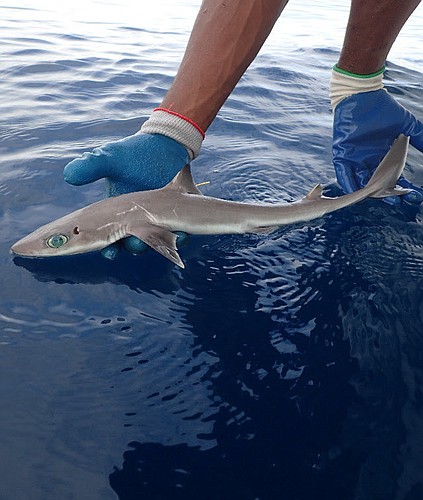- July 26, 2024
-
-
Loading

Loading

Mote Marine Laboratory’s founder Eugenie Clark was known as the “shark lady.”
Now, a new dogfish shark species is being named after her.
The species, Squalus clarkae, also known as Genie’s Dogfish, was identified from the Gulf of Mexico and western Atlantic Ocean, a release from the Florida Institute of Technology and Mote Marine Laboratory said.
Clark died in 2015 at the age of 92.
In a paper by the Florida Institute of Technology, Toby Daly-Engel, an assistant professor and shark biologist, said that because Clark was so familiar with the Gulf of Mexico, naming this species after her was appropriate.
“Dr. Clark was a trailblazer for women in shark biology,” marine scientist Mariah Pfleger of Oceana, the lead author on the paper by the Florida Institute of Technology, said in the release. Her work showed me that it was possible to make my mark in a male-dominated field. This paper is a perfect example of how her career has influenced multiple generations of women in science: The first author is a woman who graduated from a woman-led lab.”
Originally, this species was labeled as Sqaulus mitsukurii, however after genetic testing and morphology, researchers discovered it as a new species, the paper said.
In the paper, Daly-Engel said that deep-sea sharks are shaped by similar evolutionary pressure, so DNA tells scientists how long a species has been on its own and how different is it from others.
“This type of research is essential to the conservation and management of sharks, which currently face a multitude of threats, from overfishing and bycatch to the global shark fin trade,” Pfleger said in the paper. “Many fisheries around the world are starting to fish in deeper and deeper waters, and unfortunately, much less is known about many of the creatures that live in the deep. The first step to successfully conserving these species that live in deeper waters, like Genie’s Dogfish, is finding out what is down there in the first place.”
In her lifetime, Clark conducted 72 submersible dives and led more than 200 field research expeditions to various places, including the Red Sea and the Solomon Islands, to study sand fishes, whale sharks, deep sea sharks and spotted oceanic triggerfish, Mote’s release said.
She started the Cape Haze Marine Laboratory in Placida, Florida, in 1955. Later, in 1967, that lab became Mote Marine Laboratory to honor William R. Mote, the release said.